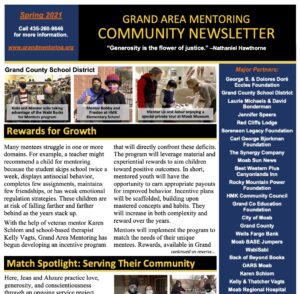Rewards for Growth
Many mentees struggle in one or more domains. For example, a teacher might recommend a child for mentoring because the student skips school twice a week, displays antisocial behavior, completes few assignments, maintains few friendships, or has weak emotional regulation strategies. These children are at risk of falling farther and farther behind as the years stack up.
With the help of veteran mentor Karen Schlom and school-based therapist Kelly Vagts, Grand Area Mentoring has begun developing an incentive program that will directly confront these deficits. The program will leverage material and experiential rewards to aim children toward positive outcomes. In short, mentored youth will have the opportunity to earn appropriate payouts for improved behavior. Incentive plans will be scaffolded, building upon mastered concepts and habits. They will increase in both complexity and reward over the years.
Mentors will implement the program to match the needs of their unique mentees. Rewards, available in Grand … Grand Area Mentoring’s incentive store (which is kindly funded by the City of Moab and by Karen Schlom), will be chosen by the mentee. Their mentor will then hold the student accountable and help them work toward a performance outcome.
For high-risk youth, a mix of tangible rewards will be the first step. Rewards might include clothing, backpacks, books, gift cards to local establishments, and special outings with their mentors. The program aims to ultimately instill in mentees a sense of intrinsic motivation by cultivating healthy habits and self-efficacy.
Incentivizing Graduation
With the help of a grant from Grand County, Grand Area Mentoring is also piloting a new program to extend mentoring relationships through high school. Starting with the class of 2025, each participating youth who graduates while still matched with their mentor will earn a $1,000 educational scholarship.
Mentee scholarships can be used to cover a range of qualifying expenses, such as tuition, rent, books, travel, and more. The purpose of this plan is to both support teens through their challenging high school experience by way of mentoring and to partially finance their post-secondary education. 95% of mentees qualify for free or reduced lunch, so this program targets children at higher risk of dropout and who might otherwise have few resources upon graduation.
View Newsletter
